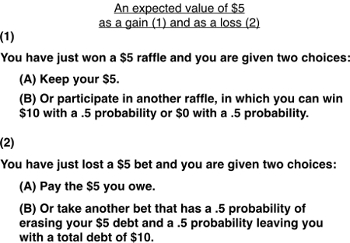Prospect Theory
Overview
Source: Laboratory of Jonathan Flombaum—Johns Hopkins University
What’s the value of a dollar? Currencies store value to facilitate trade. Implied in any economic transaction is the value of a unit of currency. But what is the subjective value of a dollar? For a long time, economists assumed the answer to this question to be, specifically, that a dollar has a value determined by the market and that the subjective value of a dollar is always that, more or less.
Beginning in the early 1970s, experimental psychologists Daniel Kahneman and Amos Tversky upended this assumption, showing that the subjective value of currency depends on a number of factors, most notably, whether losses or gains are being discussed, and the overall size of a transaction. To pump intuition, consider the fact that, to most people, it would seem reasonable to drive an extra half-mile in order to save $2 on a gallon of gas. But very few people would do the same to save $2 on the cost of a new car. So $2 is sometimes, but not always worth an extra half-mile drive. Value is context-dependent.
The theory devised by Kahneman and Tversky to describe how people psychologically value currency (and goods and services, generally) is called Prospect Theory. In 2002, Kahneman was awarded the Nobel Prize in Economics for Prospect Theory, along with related research using the methods and theories of experimental psychology to understand economic decision-making (Tversky passed away in 1996.).
Many of the primary implications of Prospect Theory were obtained through survey experiments. The surveys consisted of choices between gambles; for example, subjects might be asked whether they would prefer to receive $5 or risk receiving nothing with a 50% chance of winning $10.
This video will demonstrate procedures for designing the type of survey questions used in research on Prospect Theory.
Procedure
1. Stimulus design
- When options have known outcomes and probabilities, economists describe the value of each choice as the average of its outcomes weighted by their respective probabilities, what they call a choice’s expected value.
- For example, a guaranteed win of $5 has an expected value of $5, and a gamble that pays out $10, 50% of the time (and nothing the other 50% of the time) also has an expected value of $5: 0.5 x 0 + 0.5 x 10 = 5.
- Devise gambles that tend to lead to differen
Results
There are several classic effects that arise in these surveys. Figure 1 illustrates one effect, sometimes known as loss aversion. People seem to place a greater subjective value on losses than on gains of equivalent value. For question 1, between 60-80% of participants will typically choose A, while the same proportion will choose B for question 2. A 50% gamble seems worth the risk to avoid a debt of $5, but not to earn an extra $5. $5 is subjectively more valuable when it is a loss.
Log in or to access full content. Learn more about your institution’s access to JoVE content here
Application and Summary
Prospect Theory has had wide ranging implications and applications. That is why Kahneman was ultimately awarded the Nobel Prize.
For example, Prospect Theory explains a lot of gambling behavior, such as the tendency of people to continue gambling when they have losses. Even small losses loom large, subjectively, and it makes people willing to take risks they would not normally take when given the prospect of erasing a loss. But this usually has the effect of produc
Tags
Skip to...
Videos from this collection:

Now Playing
Prospect Theory
Cognitive Psychology
11.2K Views

Dichotic Listening
Cognitive Psychology
26.7K Views

Measuring Reaction Time and Donders' Method of Subtraction
Cognitive Psychology
44.4K Views

Visual Search for Features and Conjunctions
Cognitive Psychology
26.9K Views

Perspectives on Cognitive Psychology
Cognitive Psychology
7.0K Views

Binocular Rivalry
Cognitive Psychology
8.0K Views

Multiple Object Tracking
Cognitive Psychology
7.8K Views

Approximate Number Sense Test
Cognitive Psychology
7.6K Views

Mental Rotation
Cognitive Psychology
13.2K Views

Measuring Verbal Working Memory Span
Cognitive Psychology
12.6K Views

The Precision of Visual Working Memory with Delayed Estimation
Cognitive Psychology
5.2K Views

Verbal Priming
Cognitive Psychology
15.0K Views

Incidental Encoding
Cognitive Psychology
8.6K Views

Visual Statistical Learning
Cognitive Psychology
7.1K Views

Motor Learning in Mirror Drawing
Cognitive Psychology
55.6K Views
Copyright © 2025 MyJoVE Corporation. All rights reserved
